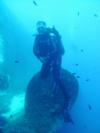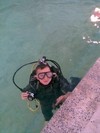
|
I was just down in NC for a few days of diving. There ARE numerous lionfish there. While they may be invasive and have no natural predators in the Atlantic, the jury’s still out on what effect they’ll have on the overall ecosystem. At any rate, I don’t think ANY of the dive operations down there would support the killing of lionfish just for the sake of killing them.
|
|

|
Well... eradication through hunting may not be feasible...
Perhaps we should start a rumor that lionfish enhance virility, and the far easterners will over-fish them into extinction in the Atlantic reef system...
Apparently, they fry up pretty nicely...
|
|

|
I work in a place selling aquariums, salt water fishes and corals. We have some lion fishes, and I use to put down my bare hand into it aquarium when wokring. All is fine.
Peace to the Lion Fishes!
/Maggie
|
|

|
mo - 7/16/2008 7:42 AM 
I read this post last night, but felt that I should have time to calm down before I replied (nothing do with the DB member that posted it)
As far as the Lionfish being an invasive species they have nothing on human kind, we are by far the most invasive species on this plant. There are over 1200 venomous fish in our oceans, should will kill them all, also there are no know fatalities caused by lionfish stings
Whether this species is endemic or not, some forget a little thing called evolution, it is all part life and when the conditions are right for a species to migrate then it will happen.
As a diver I am entering into a world that is not my home, I fell privileged that I can experience all that our underwater world has to offer, as divers we should have the greatest respect for the environment we find ourselves in and leave the oceans in the same state as when we entered the water, it’s not our home
If we killed everything in the oceans that could harm us there would be little point in diving, there would be nothing to see.
A better use of the DM would be to send him down to drag a diver back to the boat/shore that is causing harm to the environment, whether this is killing fish or braking lumps of delicate corals
Rant over
Mo
|
|

|
Eve - 7/16/2008 8:50 AM 
Here, Here, I personally agree with you.
Thank you for your comments mo.
Eve
|
|

|
hey mo and thank you for you reply. HOWEVER, you missed my point entirely and it was probably my fault for not communicating to well. I’m not worried about being stung by a lionfish. I’d get over that. The reason why I made the post AND why the Bahamian government has stated their policy, as well as the Cayman government is that this fish is an invasive species with no natural predators and is devouring all of the native fish in the area. It must be a serious enough problem for to governing bodies to institute such policies. By no means am I a tree hugger (or in this case, a reef hugger) and I know that we are "the most invasive species" in the water. Do I think we should get out of the water? Heck no. do i think think we should kill everything that could harm us? lol, heck no! Am I pissed off that jerks who didn’t want to take care of the lionfish that they had in their personal aquarium and then turned them loose in non-native waters? You damned-skippy I am. That’s how alligators got into the sewer systems in MAJOR cities? I’m more concerned about my kids (my 8 yr old is a seal teamer) being able to go to the bahamas and seeing the tons of little fish with what I like to call them "fresh batteries in them". That is the only way to describe the colors to her. Do you see my point now? Also, nothing personal to you mo. Like I said, I didn’t make my initial point clear enough.
|
|

|
mo - 7/16/2008 11:04 AM 
No offence taken, I agree that people that release none endemic species into what is not their natural environment are being irresponsible.
There are many Lionfish in the Red sea which also has a very diverse marine life, ok they are an endemic spices to the Red sea, and like those Lionfish in the Atlantic have very few natural predators other than Octopus, as they are loners and don’t shoal up I really don’t see them being anything more than eye candy for divers.
Endemic species will for sure adapt to cope with these very beautiful fish, we always tend to react to what at first looks like a catastrophe, only to find later that if we had investigated thing in a correct manner, most of the time it’s never as bad as it first looks,
That aside as the area where these fish have been found covers 62,000 square miles and most of the Lionfish live below 30m, you have no way of eradicating them
|
|

|
clyde - 7/16/2008 3:56 PM 
couldnt have put it better myself im with mo on this one
|
|

|
Lionfish eat live coral and with no natural predators they are a threat to our reef system both in the Bahamas and in the Keys where a few have been spotted off Key Largo. Someone needs to protect OUR fish from them.
|
|

|
I have raised and sold Lionfish for many years, They are one of the most beautiful creatures in our oceans!! If you ever take time to observe the Lionfish it’s truly a remarkable fish!! I can’t see why anyone would want to totally remove this beautiful fish form a certain area!! If we were talking about a closed body of water like a lake i could see a problem. But guys we are talking about oceans!!
|
|

|
The following quote is from Reef Keeping, online magazine and concerns the Lionfish.
The info can be accessed at the following website:
http://www.reefkeeping.com/issues/2002-11/fm/feature/index.php
Lionfish Sting... What To Do
“If a lionfish or scorpionfish ever stings you, the very first thing to do is immerse the wound site in hot, non-scalding water (110-113°F) for 20 to 30 minutes, or until the pain subsides. According to Michaels (1998), applying rapid heat using a hair dryer will also work. The key point is heat; lionfish venom contains many heat labile proteins, and heat will denature these venom proteins, preventing them from spreading in the bloodstream and decreasing the severity of their effects. Do not use boiling hot water; the burn resulting from boiling water will often be worse than the lionfish sting. The most frequent symptoms of a lionfish sting are pain and swelling. However, a few people may have an allergic reaction to lionfish venom and should be cautious if the pain and swelling get worse over a few hours. .”
|
|

|
I just read this article (posted below) that local grouper does eat Lionfish, so even though they are not naturally occuring and had no natural enemy, evolution has a way of working it’s wonders.
http://www.sportdiver.com/article/news/Local-Bahamas-Grouper-Appear-to-Eat-Invasive-Red-Lionfish-
|
|

|
I’ve done a little more research..........don’t kill (get mad at me) the messanger. The last link is to Scuba Diving magazine which has SEVERAL articles on the subject.
http://www.tcpalm.com/news/2008/jun/19/deadly-lionfish-invade-florida-waters/ http://oceanservice.noaa.gov/education/stories/lionfish/lion02_invade.html http://dailynightly.msnbc.msn.com/archive/2008/06/30/1176706.aspx http://www.snowscutmonthly.com/200607/immigration.htm http://search.scubadiving.com/SCUBA/EUISearch.do?qgeneral=LIONFISH&search=Search&searchType=Scuba_s742&q=&tabid=
|
|

|
Eve - 7/17/2008 10:16 AM 
Don’t you know that it is always the messenger that gets killed !
Only kidding : )
|
|

|
mo - 7/17/2008 10:59 AM 
They are known to feed mostly on crustaceans (as well as other invertebrates) and small fishes, which include juveniles of their own species. Pterois volitans consumes an average of 8.2 times its body weight per year. As juveniles they consume 5.5-13.5 g per day and 14.6 g a day as adults.
Sunset is an optimal time for Pterois volitans to begin feeding because this is when activity in the coral reef is highest. At sunset, all of the day fish and invertebrates make their way to a resting spot for the night and all of the night fish come out to begin feeding. With all of these creatures around, the lionfish need not invest much energy to find a meal. They simply glide upwards along the rock and coral sneaking up on unexpecting prey from below. While moving slowly towards a small fish, Pterois volitans uses its open pectoral rays to shield the motion of its caudal fin. This shielding along with the cryptic coloration of the predator prevents the prey from becoming alarmed. Although we find the striped colorful pattern of the lionfish obvious and easy to see in an aquarium setting, in the coral reef this colorful pattern allows the fish to blend into the background of coral branches, feather-stars, and spiny sea urchins.
The lionfish attacks with one swift gulping motion that sucks the prey into its mouth. This attack is so quick and smooth that if the victim is among a group of fish, the other fish in the group may not even notice what happened. The lionfish can continue to hunt the other unaware members of the group.
Pterois volitans has also been known to hunt for fish in the open water near the surface with a different technique. Here they wait 20-30 cm below the surface and watch for small schools of fish leaping out of the water in an attempt to escape another predator. When they plunge back into the water the lionfish is waiting just below them ready to attack
In addition to fish, Pterois volitans feed on invertebrates such as amphipods, isopods, and other crustaceans. The lionfish glides along the substrate (rocks or sand) and vibrates the rays on its fins in order the rustle the food out of hiding.
In general, the lionfish is stationary and feeds on as many fish as it can when fish are plentiful and then it fasts when food is scarce. When a lot of food is available for feeding, Pterois volitans becomes satiated or full and may not eat for at least 24 hours.
Lionfish invest most of their energy in growing to a large body size early in life. This tactic allows them to grow big at a fairly young age so that they are more likely to avoid attack by predators and increase their chances of mating successfully
If a male lionfish meets another male while hunting, the more aggressive male will turn darker in color and point its poisonous, spiny dorsal fins at the other individual who usually folds down its pectoral fins and swims away.
Pterois volitans is not currently listed as threatened or endangered. However, the increase in pollution in coral reefs is expected to kill many of the fish and crustaceans, which lionfish depend on. If lionfish are unable to adjust to these changes by selecting alternate food sources, it is expected that their populations will also decrease
|
|

|
mo - 7/17/2008 11:22 AM 
This guy has no issue with Lionfish
|
|

|
Eve - 7/17/2008 12:56 PM 
Wow, mo I did not expect that, it made me jump ! That is a very good statement and nothing was said.
Eve
|
|